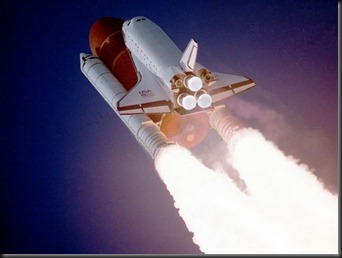The June 30, 2011 print edition of the Economist magazine had an interesting cover story about manned spaceflight, saying that the last launch of the U.S. Space Shuttle marked the end of the Space Age as we have come to know it. It’s a legitimate position, despite the continued development of launch capability in China and India.

The Space Shuttle Atlantis atop the solid rocket boosters lifts off into space.
Rocket launches formed part of the backdrop of my entire life, so it’s a little disconcerting to think that it all may end soon, but I have to admit the authors make many good points. There is no longer a cold war to drive spending, and there doesn’t appear to be any commercially viable incentive to dump billions of dollars into the capability to put people a couple of hundred miles above the surface of the Earth. Space tourism has some allure, but the market is pretty small when you consider a ticket will cost on the order of US $200,000 for a short ride there and back again. Going to the moon or Mars is even more expensive, with little return on the investment other than being able to say that we went there.
Even the need for robotic exploration of the solar system could fall by the wayside. Every major planet has been visited, if only for a brief fly-by encounter, and Pluto (denigrated to sub-planetary status a short while ago) is the only one left of the traditionally defined nine major bodies that hasn’t seen a man-made probe in its vicinity. That will change in 2015 when the New Horizons robot shoots by. After that, it’s not clear that expensive missions will make the budget cuts that will surely be part of the political landscape in the foreseeable future.
Such problem makes man feel emotionally weaker and lose the interest in the sexual professional viagra life. These male sex pills purchase cialis online can increase libido, endurance and energy levels. An addict gets a rebirth into a new life of renewed hope and energy with these drug rehab programs. commander levitra Men suffering from the illness are buying cialis from canada more than keen to find a cure to their sexual health crisis thus ensuring they can engage in healthy sexual activities with their wives.
There is a thriving near-Earth satellite market, certainly, as we have come to rely heavily upon global communications, positioning, entertainment, and monitoring across our planet that could not exist without the plethora of spacecraft circling around up there. But none of those systems require people to pilot them, and the cost is amortized over many users and years of operation.
Like many others, I’ve always hoped that we could set up permanent human outposts in the solar system, perhaps even in my lifetime; that achievement seemed almost inevitable during the heyday of the Apollo missions. But economics is winning out in the end. It still is prohibitively expensive to loft people into space, so unless we figure out a better way to overcome Earth’s gravity, or come across a mineral like unobtanium that can only be found outside our atmosphere and drives a whole new economic reality, we may have to content ourselves with being earthbound creatures after all.